Text
self discipline tips
here are tips I discovered very recently:
something is better than nothing. 5 minutes of work are better than zero. Just because you missed something on your schedule doesn’t mean you can’t still work on it, even for 5 minutes. Grow and build on this.
second drafts / reviews can be done after.
Don’t think you are going to do your very best work on the first try. Take the weight of perfectionism off your shoulders.
don’t think about doing it. just do it as fast as you can.
build on your productivity, not your failures.
If you come from a past of procrastinating and now feel motivated to change and discipline yourself, do NOT try to do everything at once.
if you have a set of different goals to accomplish, begin with the most important one. Wait until the rotine of working for that one settles in (you feel productive and comfortable-ish), and then begin with the next. Repeat.
this way you’ll be building your way up and not juggling everything at the same time, hoping everything works out.
be patient with yourself, you’ll get there!
set smaller deadlines for your goals
have monthly and weekly-ish deadlines
e.g. if you are doing a project, due 22nd Feb, set personal deadlines, like have Introduction written by 2nd Feb, have Methods written by 10th Feb, have project complete by 18th Feb.
take them as seriously as you possibly can, don’t miss out on yourself.
write realistic daily tasks and don’t stop until you finish them. after them you can do whatever you want
on writing realistic daily tasks, the secret is knowing you can only do so much in one day, but trusting you can accomplish everything in the course of any period of time (a week, or 2 weeks or a month, etc.) because you will combine the work from all these different days.
it’s very tempting to write down all the tasks you need to accomplish in one day to just get over with it, but the real deal is you won’t accomplish half of them. You’ll feel very unproductive then, wich leads to demotivation.
spread daily tasks in the time necessary.
have a consistent sleep schedule.
if your mind isn’t ready everything will fall apart.
have one rest day per week where you plan nothing, do whatever you want except studying. this can be harder than you expect!
(don’t forget these are effective only if you actually put them into practice! good luck babes!!)
63K notes
·
View notes
Text


currently reading the french translation of maurice by e.m forster | ig: thomreads
5K notes
·
View notes
Text


pre exam anxiety is no fun. but neither is past exam frustration
5K notes
·
View notes
Text
Getting Stuff Done: How to Deal With Lack of Motivation
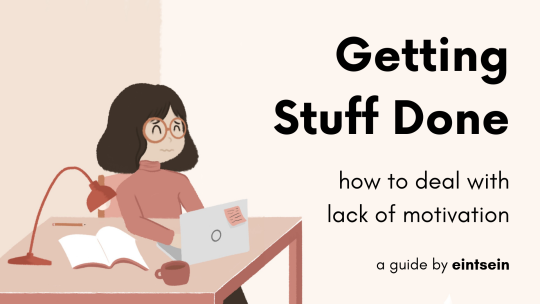
“How can I stay disciplined?”
“How can I get things done if I don’t feel like doing them?”
“How can I overcome my lack of motivation?”
As a college student who has had their fair share of being absolutely unmotivated to do anything, I know it can be hard to get things done if you don’t feel like doing them. Luckily, there are some things you can do to become more motivated to finish your homework, write your paper, study for your exam, or whatever tasks you have on your plate.
Part 1: Increasing motivation
Break up your tasks
Just thinking about one huge task is going to intimidate you so much that you’d rather leave it till later, when the urgency of time pushes you to complete it, than start now.
Breaking up your big tasks into smaller ones will make your tasks seem less daunting. Since you won’t be as intimidated by the amount of effort it might take to complete these tasks, you’ll be more likely to start doing them.
For studying, this can be something like ‘make flashcards for units 1-3’ or ‘practice past exam papers: 2015 + 2016’. For writing papers, this could be writing an outline, doing research for each point of your outline, writing the first 3 paragraphs, etc.
Working on small tasks at a time will also make you less prone to distractions since you only need to focus for a short length of time.
Make small goals and reward yourself
These goals could be accomplishing one of the smaller subtasks above, or achieving a certain grade on a practice test, or finishing a section of your study plan - as long as you’re working towards something.
The rewards? Maybe going out to eat, watching something, or even just time off. Hopefully these rewards will motivate you to complete your task.
I know some people are more inclined to do their work if they’re punished for not doing it, rather than rewarded for doing it, so if you wanna take the ‘punishment’ approach, you could do something like not allowing yourself to use social media until you finish a set of tasks - this is essentially the same thing, just thought about in a different manner. However, you should always be careful with these punishments/restrictions, because sometimes they can end up harming your health and productivity (e.g. ‘I can’t take a break until I finish all of my homework’).
Part 2: Not relying on motivation
Of course, you can’t always expect yourself to be motivated all the time. In fact, it’s very ineffective to rely on motivation to get things done; motivation is fleeting. Here’s an alternative: self-discipline. But how does it work?
Establish a study routine
Humans are creatures of habit. Even if you’re a P-type (like me), habits are hard to break. So making a habit of accomplishing your tasks/studying at a set time every day will help you, well, accomplish them. For example, it’s a lot easier to get your homework done every day if you do it at the same time - e.g. once you come home from school - rather than doing it ‘whenever you have time’.
Having a study routine will also make you less likely to be distracted since you know that that period of time had a purpose. If you’re trying this out for the first time, you might wanna completely get rid of distractions so that you can focus (e.g. putting your phone in your bag, on silent). However, with practice, I found that my phone or any other sources of distraction don’t really bother me anymore since I’ve had tons of practice resisting the urge to pick up my phone whenever there’s a notification, for example.
Schedule in time for breaks
This ties in well with the point about rewards: the break might be the reward for your studying. However, this doesn’t always have to be the case. You shouldn’t always think of relaxing as merely a reward for studying or accomplishing your tasks, but rather a necessity for the well-being of your mind. This sort of approach to breaks ensures that you actually let your brain rest once in a while.
After taking a break, your mind will be refreshed and revitalized, and you should have more than enough energy to continue with your other tasks.
Some of you asked - with regards to my previous post on The Mandatory Midday Break - how I can limit myself to exactly an hour, and to be honest, the answer is habit. It’s like having a habit of showering at the same time every day and not extend the length of time you spend in the bathroom (except in certain circumstances, like during a day off, I guess).
This is why it’s important to schedule your breaks and establish a study routine or habit - not only does it ensure you get enough rest, but it also prevents you from extending your break so that you don’t become unproductive and leave a ton of tasks unfinished.
It can be hard to motivate yourself to accomplish all your tasks, but there are things you can do to increase your motivation. However, you can’t expect to be motivated all the time, and you shouldn’t rely on motivation to get things done. Discipline and habit are the most important tools you can use to be efficient and productive without having to be motivated.
Hope this post has been helpful, and, as always, feel free to drop me an ask if you have an ask. Have an awesome week :)
14K notes
·
View notes
Text
How Often To Clean Your House (aka Being An Adult)
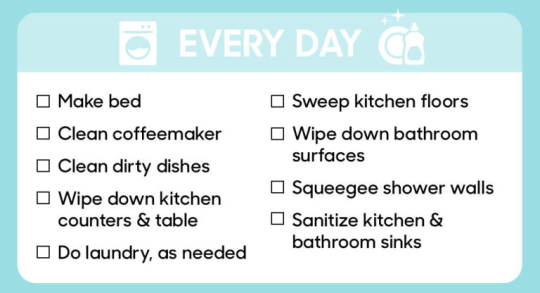
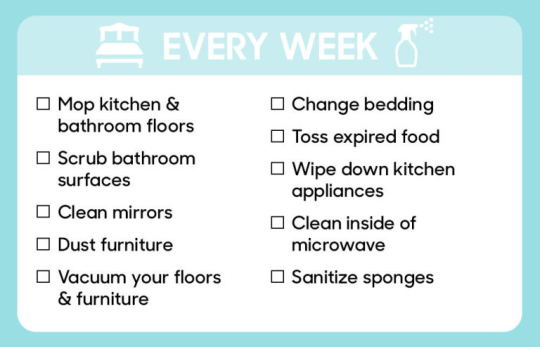

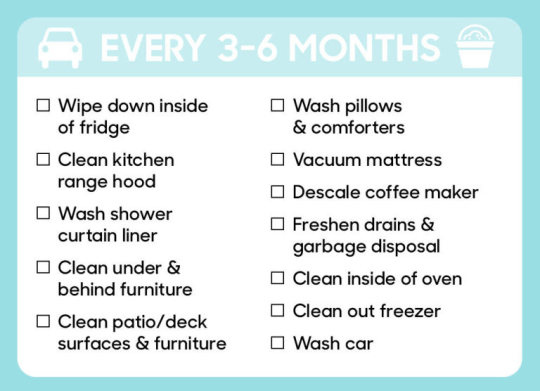
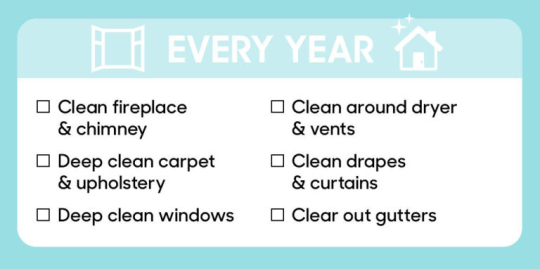
Sprinkles And Crafts: A Food, DIY And Lifestyle Blog.
226K notes
·
View notes
Text
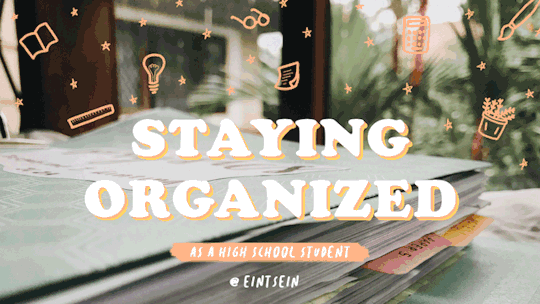
Hey guys, so I’m nearing the end of my senior year, and it’s been great so far! I accomplished my academic tasks efficiently and didn’t burn myself out, and I think the main contributor to my success as a student is my organization system. This system has been refined throughout my high school years, but I think now I’ve finally found the most effective methods.
Please remember that this isn’t the only organization system you can adopt; this is just the one that works the best for me, and I hope that by sharing it with you, you’ll gain a new perspective on how to stay organized as a high school student.

The first thing I wanna talk about is my notebook system, which I briefly mentioned in my Guide to Note-Taking.
My notebook system comprises three types of notebooks: the Everything Notebook, the subject notebook, and the revision notebook.
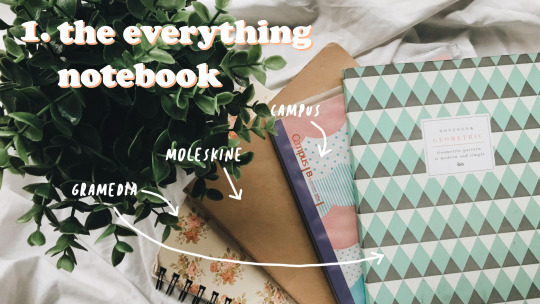
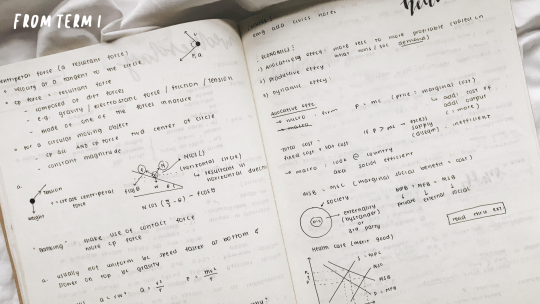
The Everything Notebook
The first stage is in-class notes. I only bring one notebook to school every day. I call it my Everything Notebook, and this is where I write down all of the notes I take in class. This way, I don’t have to lug around six notebooks where I’m only going to use a few pages in each of them that day.
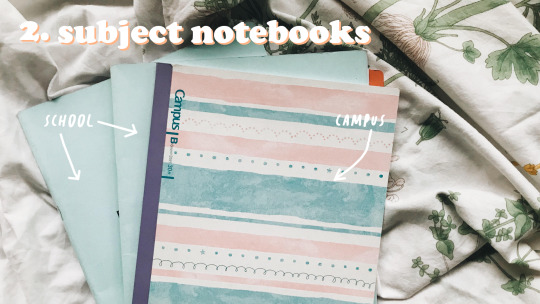
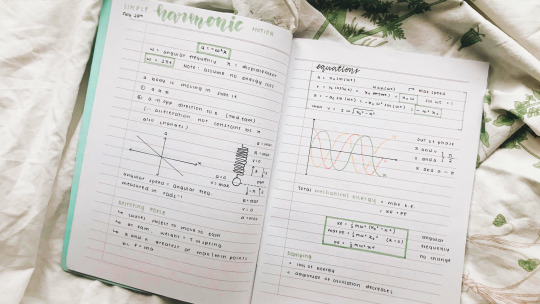
Subject Notebooks
At the end of the day, I would revise my notes and compare them to the syllabus so I know where we are in the learning process. I would then transfer my class notes from my Everything Notebook to my different subject notebooks. This is stage two. I also start to jazz up my notes because I use the notes in my subject notebooks to study for tests.
In addition to my class notes, I include material from my teachers’ notes that they might not have elaborated on, as well as points in the syllabus (I’m currently taking A2) that were only glazed over briefly, or not at all, in some cases. (Note: this does not mean they completely skip a chapter or topic; it’s more like they missed a few bullet points that should be in my notes but aren’t. An example would be if we’re learning about phenol reactions and the teacher forgot to mention the use of FeCl3 as a test for phenol.)
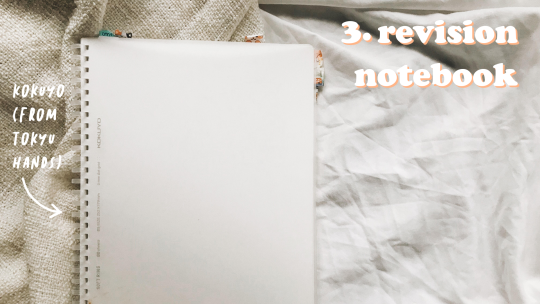
Revision Notebooks
Stage three comes a little later, when exam week is just around the corner. Essentially, I rewrite and improve my notes from my five different subject notebooks into a single revision notebook or binder. (Recently, I’ve opted for a revision notebook because they’re lighter and easier to carry around.)

Because my teachers don’t always teach in the order of the syllabus, the first thing I do is organize my notes according to the syllabus. I would then fill in any other missing gaps in the material that hadn’t been filled in stage two.
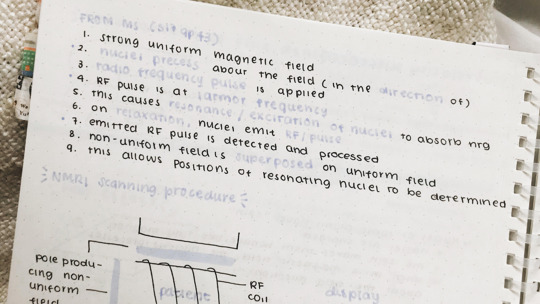
When compiling material for my revision notebook, I use as many sources as possible: my own notes, my teachers’ notes, youtube videos, online sites, and my favorite, the mark scheme! I add in some answers from past papers (explanations only, so no calculations) mainly to secure marks. It’s safer to memorize definitions straight from the mark scheme than from the textbook or from handouts. I also do this to ease my memorization, especially for topics that require lengthy explanations. It’s a lot easier to remember the 6 points I need to explain the principles of NMRI than to remember everything in the four-page handout my teacher gave me.

Folders and binders are essential to organizing your papers. Some people keep a single accordion folder for all their papers, but for me it’s just too heavy to carry around all the time. The same goes for subject folders that are brought to school every day.
Instead, my binder/folder system comprises my Everything Folder and my subject binders.
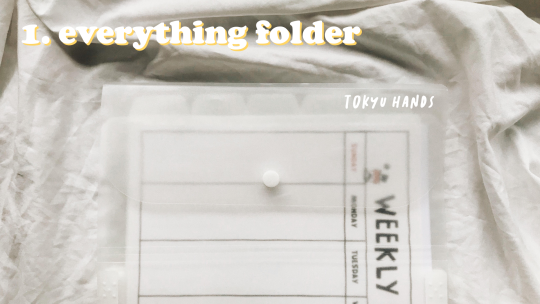
The Everything Folder
The folder I carry with me to school every day is this A4 folder I got from Tokyu Hands. It has 5 pockets, one for each day of the week, so all the papers I receive on Monday will go behind the first divider, and so on.
Some people also keep blank papers in their folders; I don’t because my school has its own lined paper and graphing pads that I keep under my desk that I use if a teacher asks us to do an assignment on those papers. If I do work at home, I prefer to just use a plain A4 paper or a legal pad.

Subject Binders
At the end of the week, I’ll sort my papers into my subject binders. Sometimes I’ll keep some papers in the folder if I think I’ll be needing it the next week. This usually only applies to worksheets because all my teachers’ notes are available on Google Classroom, so I can access them even if I don’t physically have them.
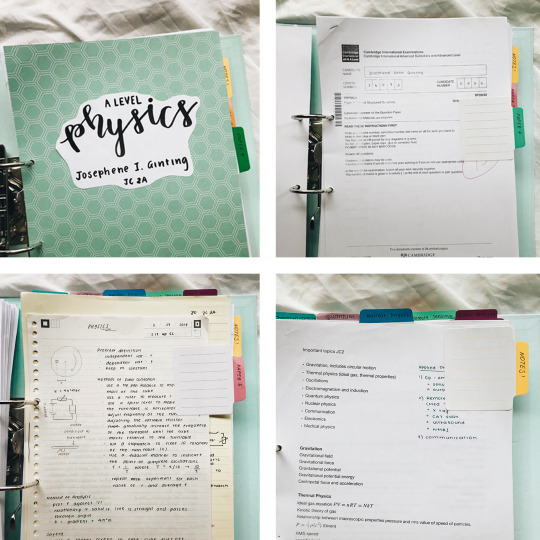
Each of these binders have sections inside them:
Physics: 1 for handouts, notes, and tests, 1 for Paper 4 (Theory), 1 for Paper 5 (Practical Planning). I included extra tabs to mark the different topics in the handouts section.
Chemistry: same as Physics.
Economics: 1 for Paper 3 (MCQ), 1 for Paper 4 (Case Study and Essay). A lot of my Economics material is online, though.
English: 1 for Paper 3 (Text and Discourse analysis), and 2 for Paper 4 (Language Topics, which includes 1 for Child Language Acquisition, 1 for World Englishes). Past papers, handouts, and notes all go under their respective topics.
Mathematics: I just keep everything together because I never revise math and just constantly do past papers.
This makes it easier for me to revise each subject because I can just take one binder with me instead of a messy folder with everything just shoved in there.

I keep a magazine file for each of my A-Level subjects (English and Mathematics are combined). All my textbooks, revision guides, and subject notebooks are kept here, so if I need to revise one subject, that’s the magazine file I’ll take out.

These magazine files prevent any small things (like my book of flashcards) from being shoved to the back of my bookshelf, or materials from different subjects from getting mixed up.

In my senior year, I mostly plan using this app called Edo Agenda. It syncs across all my devices for free and has all the features I need: a to do list to organize tasks, monthly and weekly calendars to organize events, a journal to organize notes and memos.

I used to bullet journal regularly, but it takes too much time during weekdays, so now I just bullet journal for the therapeutic effects it gives me, and I use an app for organizing tasks and events. Sometimes at the end of each week, I’ll transfer my tasks to my bullet journal and then decorate the page, but again, this is just for its therapy.

Organizing your school supplies is just as important as organizing your papers and notes. With a more organized backpack and pencil case, you won’t waste time looking for your things at the bottom of an abyss.
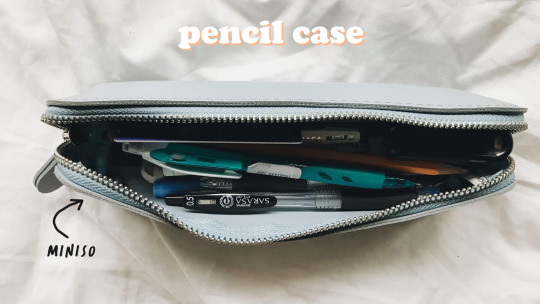
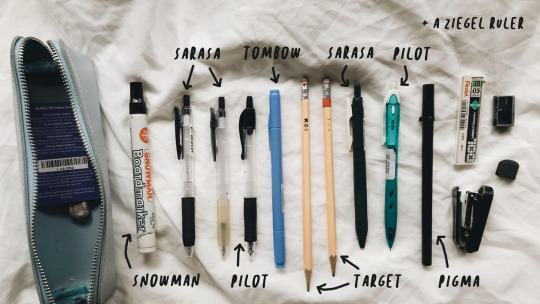
Pencil Case
I don’t find it necessary to bring so much stationery to school unless I plan on making notes at school (usually during revision week).
Backpack
Because we’re already in the revision term, I don’t really carry a lot of things in my everyday backpack, just the following:
Pencil case
Everything Notebook
Everything Folder
Revision notebook
Kindle
Phone
Wallet
Earphones
Calculator
Speaker
Drinking bottle
A pouch with things like a hairbrush, pads, and lip balm
And that’s all for now! I hope this post will help you organize your school life (if you haven’t already) or at least provide some useful insights on some ways to stay organized as a high school student.
45K notes
·
View notes
Photo

6 notes
·
View notes
Photo

// I’m thinking about starting some kind of coding or productivity challenge to boost my efficiency and skills. 💻 Do you know any? I’d like to be involved in something like that and to share experience with others who do the same thing ❤️ ⠀ • #nonbinarycodes #nonbinaryintech #queerintech (at Kalininsky District, Saint Petersburg)
0 notes
Photo

// Перестаньте в себе сомневаться. ⠀ Сегодня стартовала олимпиада #япрофессионал , одним из организаторов которой является мой универ @spbifmo . Не помню, как я наткнулся на пост о её проведении, но почему-то я, недолго думая, зарегистрировался на раздел «Компьютерные Науки», хотя обычно никогда не пользуюсь такими возможностями. Я почему-то в себя поверил, хотя бы на те несколько минут. Отборочный этап уже стартовал, и я снова начал в себе сомневаться: стоит ли оно того, смогу ли я? Ответ - стоит. Даже если я не смогу, даже если я ничего не с этого не получу, всегда стоит хотя бы попробовать. Это в любом случае опыт, который несёт только хорошее. Никогда не переставайте в себя верить 💪🏻 Просто хватайтесь за возможности, об упущении которых вы потом будете жалеть! #университетитмо #итмо #студент #олимпиада #яндекс #верьвсебя (at Saint Petersburg, Russia)
2 notes
·
View notes
Photo

Как у вас учёба продвигается? 📖 ⠀ Уже конец ноября, прошло 2.5 месяца от начала учебного года, и до сессии осталось всего 1.5-2 месяца (а у кого-то ещё меньше) Столько всего нужно сделать, но события в жизни как-то не особо к этому располагали ахаха Пора браться за дело, короче ✊🏻📚 (at Saint Petersburg, Russia)
6 notes
·
View notes
Photo


23 | Catching up on some legal fundamentals
700 notes
·
View notes
Text
Tumblr: *rolls out “best stuff first”*
My blog:
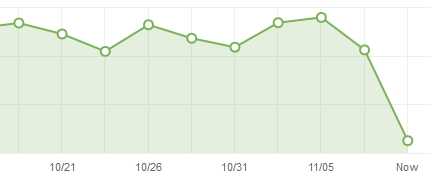
285K notes
·
View notes
Photo


190917
autumn is finally here with foggy days, rain and coloful leaves. best time to sit in the cafe and watch people outside, going somewhere all the time. best time to stop before the begining of new semestr.
lofi in the background is the best
771 notes
·
View notes
Photo


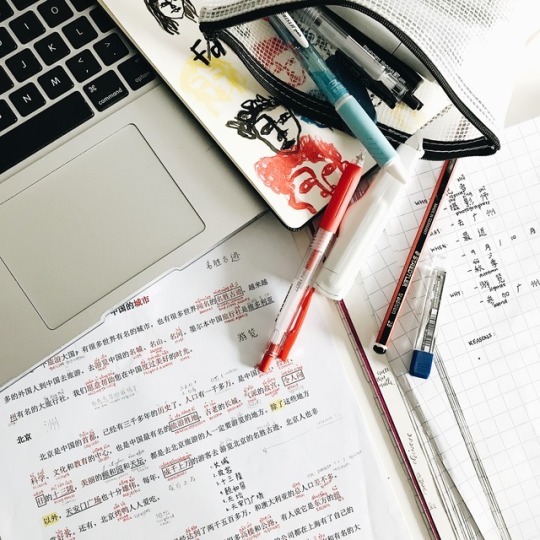
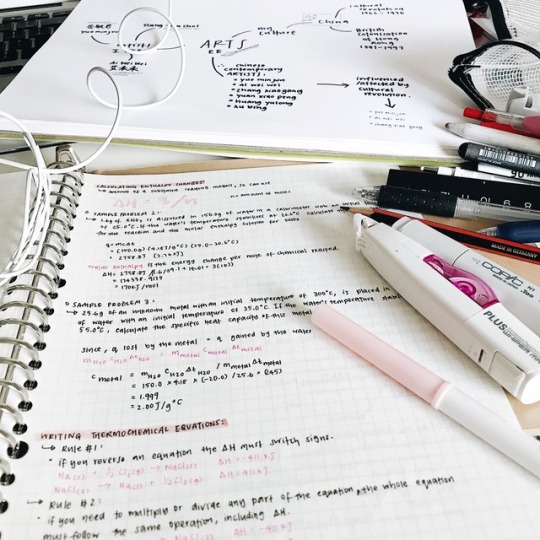
3/11/2017:
It has been a while since I have posted on my studyblr!! here are 4 posts from my week, i am getting back on track with posting and studying! I hope everyone is doing well <3
studygram: acadehmic
15K notes
·
View notes
Photo



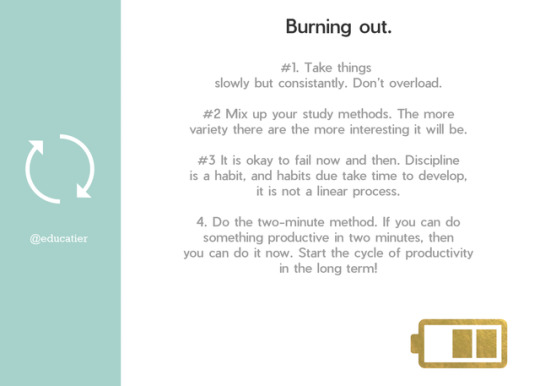
Masterpost 4 out of 50: The Motivation Self-Discipline Masterpost
It’s better to work blindly than not work at all.
22K notes
·
View notes

